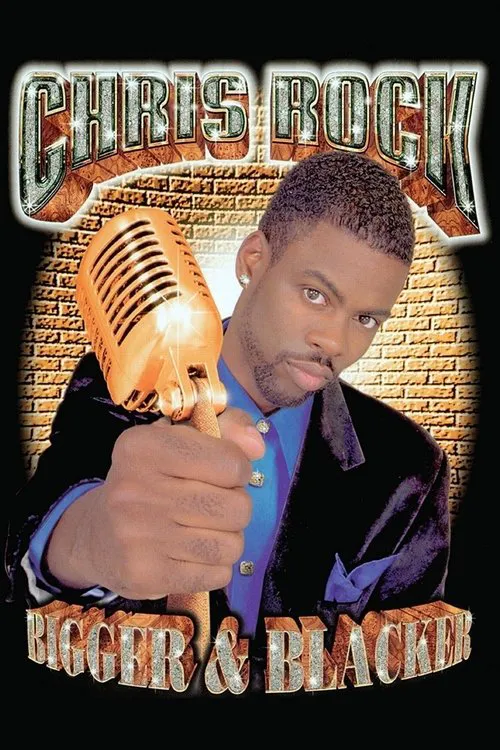Chris Rock: Bigger & Blacker

Plot
The HBO special 'Chris Rock: Bigger & Blacker' marks the culmination of a pivotal moment in Chris Rock's career, as he delves into the complexities of contemporary issues through his signature brand of biting wit and incisive commentary. Filmed in 1999, this stand-up masterpiece encapsulates a critical juncture in Rock's trajectory, as his unique voice resonated with audiences worldwide, tackling topics that remained taboo or were handled with sensitivity, yet rarely humorously. The special commences with Chris Rock's characteristic self-deprecation, as he addresses his rising fame and the associated pressures of expectation. Rock's humor is characterized by its conversational nature, which makes it feel authentic and unguarded, allowing the audience to relate to his experiences and observations. He reminisces about childhood, highlighting the harsh realities of growing up in the public housing projects of Brooklyn, New York. His anecdotes are laced with wry observations, offering searing insight into the social, economic, and cultural nuances that shaped his formative years. One of the central themes in 'Bigger & Blacker' is gun control. Rock tackles this contentious issue with his trademark candor, laying bare the hypocrisy and illogic that often underpin discussions around firearms. He juxtaposes the relative ease with which civilians can acquire guns in the United States with the stricter regulations in other countries, making a compelling argument for more stringent controls. This critique of American exceptionalism, often wielded to justify lax regulations, is both incisive and humorous, showcasing Rock's impressive ability to navigate complex topics with ease. President Clinton also receives significant attention in the special, with Rock subjecting him to withering criticism for his handling of high-profile scandals, such as the Monica Lewinsky affair. Rock's commentary is marked by its nuance, acknowledging both Clinton's undeniable charisma and his propensity for reckless behavior. By highlighting these contradictions, Rock creates a nuanced portrait of a figure who remains an enigmatic figure in American politics. In addition to these macro-level critiques, Rock also explores more personal and introspective terrain. He discusses his experiences with racism, recounting instances where he has faced prejudice or had to confront his own racial biases. This self-awareness and willingness to examine his own privilege demonstrate a level of maturity and introspection that has come to characterize much of Rock's work. His observations on racism are particularly insightful, as he identifies the ways in which even well-intentioned individuals can unwittingly perpetuate systemic injustices. The special also touches on issues of homophobia and black leadership, with Rock tackling these complex topics with characteristic aplomb. His discussion of homophobia highlights the often-narrow-minded views prevalent within African American communities, while his critique of black leaders like Al Sharpton and the Congressional Black Caucus (CBC) emphasizes the need for accountability and authentic representation. By holding those in power accountable, Rock asserts that black leaders must be willing to challenge the status quo and advocate for meaningful change, rather than merely serving as token mouthpieces for the interests of the powerful. Throughout 'Bigger & Blacker', Chris Rock displays an unwavering commitment to examining the darkest corners of the human experience, often through his biting humor and wry observations. The special serves as a testament to his unflinching willingness to confront the most pressing issues of his time, refusing to shy away from the uncomfortable truths that often accompany such discussions. As a cultural commentator, humorist, and social critic, Chris Rock has few equals; 'Bigger & Blacker' stands as a landmark moment in his oeuvre, cementing his status as one of the most incisive and innovative voices in contemporary comedy.
Reviews
Recommendations




